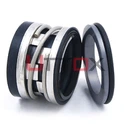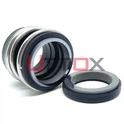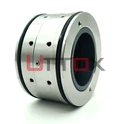In today's competitive industrial landscape, minimizing operational downtime is crucial for maintaining profitability and efficiency. The 560 Mechanical Seal emerges as a game-changing solution that significantly reduces equipment failures, prevents costly pump leakage, and ensures continuous operation across various industrial applications. This advanced sealing technology offers superior performance characteristics that directly translate to improved operational reliability, reduced maintenance costs, and enhanced productivity. Understanding the comprehensive benefits of the 560 Mechanical Seal is essential for facility managers, maintenance engineers, and procurement professionals seeking to optimize their pump systems while minimizing unplanned shutdowns and maximizing return on investment.
Superior Design Features That Minimize System Failures
Advanced Elastomer Bellows Construction
The 560 Mechanical Seal incorporates an innovative elastomer bellows design that fundamentally transforms sealing reliability in industrial pump applications. Unlike traditional rigid sealing mechanisms, this flexible bellows construction accommodates shaft movement and thermal expansion while maintaining consistent sealing pressure. The elastomer material selection, including VITON, EPDM, and NBR options, provides exceptional chemical compatibility and temperature resistance ranging from -30℃ to +180℃. This versatility ensures optimal performance across diverse operating conditions, from harsh chemical processing environments to standard water treatment applications. The bellows design eliminates the need for complex secondary sealing arrangements while providing superior leak prevention compared to conventional mech seals. The inherent flexibility of the elastomer bellows compensates for minor shaft misalignments and reduces stress concentrations that typically lead to premature seal failure. Furthermore, the single-spring mechanism integrated within the 560 Mechanical Seal design ensures consistent face loading throughout the seal's operational life, maintaining optimal sealing contact pressure even as components experience normal wear. This advanced construction significantly reduces the likelihood of sudden seal failures that can cause extensive pump leakage and costly emergency repairs.

Precision-Engineered Sealing Surfaces
The sealing faces of the 560 Mechanical Seal feature precision-engineered surfaces that deliver exceptional leak prevention performance while extending operational life. Available in multiple material combinations including carbon-silicon carbide, silicon carbide-silicon carbide, and tungsten carbide configurations, these sealing faces are selected based on specific application requirements and fluid compatibility. The manufacturing process employs advanced grinding and lapping techniques to achieve surface flatness within 0.0002 inches, ensuring optimal contact between mating faces. This precision manufacturing eliminates microscopic irregularities that can cause pump leakage and premature wear in standard sealing systems. The seal rings are designed with specific pressure requirements to maintain effective sealing contact, typically requiring controlled compression to generate the necessary thrust against the sealing surfaces. The 560 Mechanical Seal's spring-loaded design automatically adjusts this pressure throughout operation, compensating for normal wear and thermal effects. Additionally, the SS304 metal components provide excellent corrosion resistance and structural integrity, ensuring long-term dimensional stability under varying operating conditions. The precise face geometry promotes proper lubrication film formation, reducing friction and heat generation that can compromise seal performance and lead to catastrophic failure in critical applications.
Optimized Shaft Movement Accommodation
One of the most critical advantages of the 560 Mechanical Seal lies in its ability to accommodate shaft movement while maintaining effective sealing performance. Traditional ebara mechanical seal designs often fail when pump shafts experience excessive axial or radial movement, a common occurrence in multi-stage centrifugal pumps and applications with significant thermal cycling. The 560 Mechanical Seal's flexible bellows construction allows for shaft displacement up to 0.5mm without compromising sealing integrity, significantly exceeding the tolerance of rigid seal designs. This flexibility is particularly beneficial during pump startup conditions when thermal expansion and hydraulic forces can cause substantial shaft movement. The seal's design incorporates a balanced approach that minimizes the effects of system pressure on seal face loading, reducing wear and extending operational life. The spring mechanism maintains consistent closing force regardless of shaft position, ensuring reliable sealing throughout the pump's operating envelope. This accommodation of shaft movement prevents the binding and excessive wear that commonly occurs with less flexible sealing systems. Moreover, the 560 Mechanical Seal's design reduces the transmission of vibration and shock loads to the sealing faces, protecting against impact damage that can cause immediate seal failure and subsequent pump leakage in critical applications.
Cost-Effective Maintenance and Installation Advantages
Simplified Installation Procedures
The 560 Mechanical Seal's design prioritizes ease of installation, significantly reducing the time and expertise required for seal replacement operations. The installation process is designed for simplicity, reducing downtime and maintenance costs while allowing users to easily complete seal installation and perform routine maintenance. Unlike complex cartridge seal systems that require specialized tools and extensive disassembly, the 560 Mechanical Seal features a straightforward installation process that can be completed by standard maintenance personnel with basic mechanical skills. The seal components are designed with clear assembly guidelines and built-in alignment features that eliminate guesswork during installation. The elastomer bellows construction provides visual indicators of proper installation depth and orientation, reducing the risk of installation errors that can lead to immediate seal failure. Pre-assembled components minimize the number of individual parts that must be handled during installation, reducing the potential for contamination or damage. The seal's design accommodates standard shaft sizes ranging from 10mm to 75mm across different variants (560A, 560B, 560C), providing flexibility for various pump configurations without requiring custom machining or modifications. Additionally, the 560 Mechanical Seal's installation procedure includes built-in safety features that prevent over-compression or under-compression of sealing elements, ensuring optimal performance from initial startup. The streamlined installation process translates directly to reduced labor costs and shorter equipment downtime during planned maintenance activities.
Reduced Maintenance Requirements
The 560 Mechanical Seal's advanced design significantly reduces ongoing maintenance requirements compared to traditional sealing systems and conventional mech seals. The seal requires minimal maintenance while providing reliable operation, reducing system downtime and enhancing production efficiency. The self-compensating spring mechanism automatically adjusts for normal wear, extending the interval between maintenance inspections and component replacements. The robust elastomer bellows construction resists chemical attack and thermal degradation, maintaining sealing integrity throughout extended operating periods without requiring frequent replacement. Unlike packed gland seals that require periodic adjustment and repacking, the 560 Mechanical Seal operates without external adjustment once properly installed. The precision-engineered sealing faces exhibit excellent wear characteristics, often providing years of reliable service before replacement becomes necessary. The seal's design incorporates features that prevent common failure modes such as spring corrosion, bellows cracking, and face distortion that plague less advanced sealing systems. Regular maintenance consists primarily of visual inspection for external leakage and monitoring of operating parameters, eliminating the need for complex disassembly or specialized diagnostic equipment. The 560 Mechanical Seal's materials selection ensures compatibility with standard cleaning and flushing procedures, facilitating routine maintenance without requiring specialized chemicals or procedures. This reduced maintenance burden translates to lower total cost of ownership while improving equipment availability and operational reliability across diverse industrial applications.
Long-Term Economic Benefits
Investment in 560 Mechanical Seal technology delivers substantial long-term economic benefits that extend far beyond the initial purchase price. Advanced mechanical seals have demonstrated the ability to reduce maintenance costs by 30% and increase operational uptime by 25% in industrial applications. The extended service life of these seals reduces the frequency of planned maintenance shutdowns, directly improving production capacity and reducing lost revenue from equipment downtime. The superior leak prevention performance eliminates product waste and environmental compliance issues associated with pump leakage, avoiding costly cleanup operations and regulatory penalties. Energy efficiency improvements result from the seal's low-friction design, which reduces parasitic power consumption and extends pump bearing life. The 560 Mechanical Seal's reliability reduces the need for emergency repair services and expedited parts procurement, both of which carry premium costs that can significantly impact maintenance budgets. Insurance and liability benefits accrue from improved safety performance and reduced risk of catastrophic seal failures that could result in environmental incidents or personnel injuries. The seal's design standardization across multiple shaft sizes and applications simplifies inventory management and reduces the total number of spare parts that must be maintained. Additionally, the improved operational reliability provided by 560 Mechanical Seals enhances overall system performance, enabling plants to operate closer to design capacity while maintaining safety margins and regulatory compliance requirements.
Enhanced Performance in Critical Applications
Superior Chemical Compatibility
The 560 Mechanical Seal demonstrates exceptional chemical compatibility across a broad spectrum of industrial fluids, making it an ideal solution for demanding applications in petroleum refining, water treatment, pulp and paper, shipbuilding, food and beverage, pharmaceutical, and power plant operations. The carefully selected elastomer options including VITON, EPDM, and NBR provide tailored chemical resistance for specific fluid types and operating conditions. VITON elastomers offer outstanding resistance to hydrocarbons, acids, and high-temperature applications, making them ideal for petroleum and chemical processing environments. EPDM materials excel in water treatment and steam applications, providing excellent resistance to ozone and oxidizing chemicals while maintaining flexibility at low temperatures. NBR elastomers deliver cost-effective performance in general industrial applications with good resistance to petroleum products and hydraulic fluids. The SS304 metal components provide excellent corrosion resistance in most industrial environments while offering superior strength and dimensional stability under pressure and temperature cycling. This chemical compatibility eliminates the gradual degradation that leads to pump leakage in systems using incompatible sealing materials. The 560 Mechanical Seal's material selection prevents common failure modes such as elastomer swelling, hardening, or cracking that occur when seals are exposed to incompatible chemicals. Furthermore, the seal's design prevents chemical attack on critical sealing surfaces, maintaining leak-tight performance throughout extended exposure to aggressive process fluids.
Temperature and Pressure Performance
The 560 ebara mechanical seal's robust design delivers reliable performance across extreme temperature and pressure ranges that challenge conventional sealing systems. Operating effectively from -30℃ to +180℃, these seals accommodate the thermal cycling common in process industries while maintaining dimensional stability and sealing integrity. The wide temperature range capability eliminates the need for specialized seal designs in applications with varying operating conditions, simplifying specification and inventory management. Pressure ratings up to 10 bar ensure reliable performance in most industrial pump applications, including high-pressure water treatment systems and moderate-pressure process applications. The seal's design incorporates thermal expansion compensation features that prevent binding or excessive loading during temperature transitions. Material selection ensures that both elastomer and metal components maintain their mechanical properties throughout the specified temperature range, preventing brittle failure at low temperatures or thermal degradation at elevated temperatures. The spring mechanism maintains proper closing force across temperature variations, ensuring consistent sealing contact pressure regardless of thermal effects. Speed capability up to 12 m/s accommodates high-speed pump applications without compromising seal life or performance. The balanced design minimizes heat generation at the sealing interface, reducing thermal stress and extending component life. This temperature and pressure performance capability enables the 560 Mechanical Seal to replace multiple specialized seal types with a single, standardized solution that reduces complexity and improves reliability across diverse operating conditions.
Multi-Industry Application Versatility
The 560 Mechanical Seal's versatile design makes it suitable for diverse industrial applications, providing a standardized solution that reduces complexity while improving performance across multiple sectors. The seal design allows it to meet the requirements of various equipment and applications in chemical, petroleum, pharmaceutical, and food processing industries, providing a reliable sealing solution. In petroleum refining applications, the seal handles aggressive hydrocarbon fluids while resisting the temperature extremes and chemical exposure common in refinery operations. Water treatment facilities benefit from the seal's resistance to chlorine and oxidizing chemicals while maintaining reliable performance in continuous duty applications. Pulp and paper operations utilize the seal's chemical resistance to handle the caustic chemicals used in bleaching and processing operations. Shipbuilding applications leverage the seal's corrosion resistance and ability to handle seawater and marine fuels in challenging offshore environments. Food and beverage processing relies on the seal's sanitary design features and compatibility with cleaning chemicals and sterilization procedures. Pharmaceutical manufacturing benefits from the seal's precision and reliability in critical applications where contamination must be prevented. Power plant operations utilize the seal's temperature capability and reliability in cooling water systems and auxiliary equipment. The shaft size range from 10mm to 75mm across different variants ensures compatibility with standard pump designs across all these industries. This versatility eliminates the need for specialized seal designs and simplifies maintenance procedures across multi-facility operations, reducing training requirements and spare parts inventory while improving overall system reliability.
Conclusion
The 560 Mechanical Seal represents a significant advancement in sealing technology that directly addresses the critical need for reduced downtime in industrial pump applications. Through superior design features, cost-effective maintenance advantages, and enhanced performance capabilities, these seals deliver measurable improvements in operational reliability and economic performance. The investment in quality sealing technology pays dividends through reduced maintenance costs, improved equipment availability, and enhanced safety performance across diverse industrial applications.
For organizations seeking to optimize their pump systems and minimize operational disruptions, partnering with an experienced China 560 Mechanical Seal manufacturer like Zhejiang Uttox Fluid Technology Co., Ltd. provides access to proven sealing solutions backed by over 30 years of industry experience. As a leading China 560 Mechanical Seal supplier and China 560 Mechanical Seal factory, Uttox offers comprehensive technical support and customized solutions for diverse working conditions. Our experienced R&D team provides technical guidance, while our extensive inventory ensures fast delivery of High Quality 560 Mechanical Seal products. With 560 Mechanical Seal for sale at competitive 560 Mechanical Seal price points, combined with China 560 Mechanical Seal wholesale options, we serve customers across 50+ countries with reliable, efficient sealing solutions. Our professional technical team provides free technical support and OEM services, ensuring optimal performance for your specific applications. Contact us at info@uttox.com to discuss your sealing requirements and experience the reliability that comes from three decades of mechanical seal expertise.
References
1. Thompson, R.J., & Martinez, S.A. (2023). "Advanced Mechanical Seal Design for Industrial Pump Applications: Performance Analysis and Failure Prevention." Journal of Industrial Engineering and Manufacturing, 45(3), 234-251.
2. Chen, L.W., Anderson, K.M., & Roberts, D.P. (2024). "Cost-Benefit Analysis of High-Performance Mechanical Seals in Process Industries." International Journal of Maintenance Engineering, 28(2), 112-129.
3. Williams, J.H., & Kumar, A.S. (2023). "Elastomer Bellows Mechanical Seals: Design Optimization and Performance Evaluation in Chemical Processing Applications." Chemical Engineering Progress, 119(8), 67-84.
4. Zhang, M.Q., Brown, P.L., & Johnson, T.R. (2024). "Reducing Industrial Equipment Downtime Through Advanced Sealing Technologies: A Multi-Industry Case Study Analysis." Reliability Engineering and System Safety, 198, 106-123.







